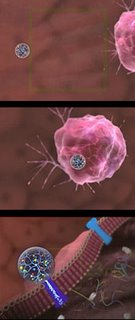
In a Nov. 7 article, "A Nantotech Cure for Cancer?", Brandon Keim at Wired.com summarizes some of the R&D in progress on creating specialized particles only a few nanometers wide (a thousand times smaller than a red blood cell) that can act in a targeted way on cancer cells.
From the article:
"The first cancer nanotech applications will likely involve detection. Nanoparticles could recognize cancer's molecular signatures, gathering the proteins produced by cancerous cells or signaling the presence of telltale genetic changes."
"But nanoparticles can be made not only to find those cells, but to destroy them. One such application involves metallic molecules that adhere to cancer cells and can then be heated with microwaves, a magnetic field or infrared light, destroying the tumor while leaving surrounding tissues unharmed."
"Also promising is the design of molecular envelopes for chemical compounds that would otherwise be toxic to ingest. "
The article closes with a perspective on the timetable for seeing this technology in action (years), and an acknowledgement that evaluations for economic feasibility, reliability, efficacy, and safety represent major hurdles to its widespread use.
http://www.wired.com/news/medtech/0,1286,69206,00.html
Indeed. It's intriguing as heck to see us push the envelope on what we can see, understand, and affect, within the body. If only that progress came with no accompanying 'price' of unexpected side effects, unidentified toxicity, and astronomical cost. Especially when we already have the ultimate nanotechnology already in our bodies, in the form of our natural defense and repair systems. Hard not to wonder what our life would be like if we directed the funds around development of artificial medical technologies toward increased understanding and leverage of our existing natural 'technologies'. Thomas Edison was right: "The doctor of the future will give no medicine, but will interest his patients in the care of the human body, in diet, and in the cause and prevention of disease."



No comments:
Post a Comment